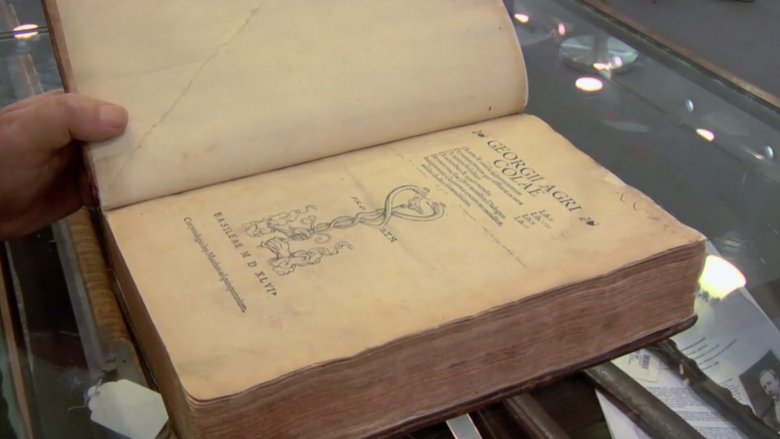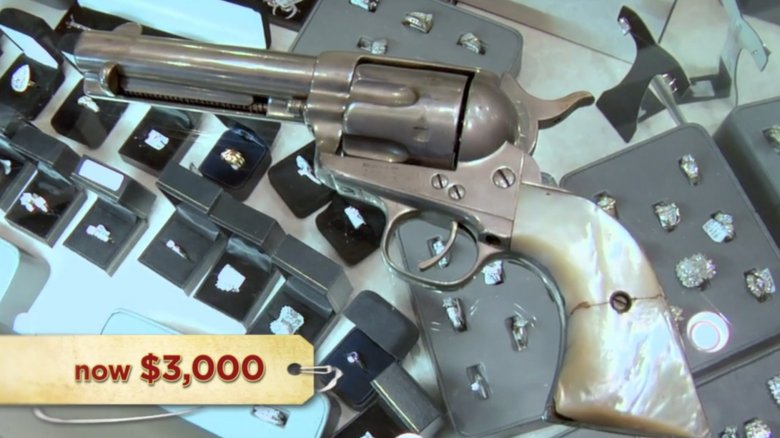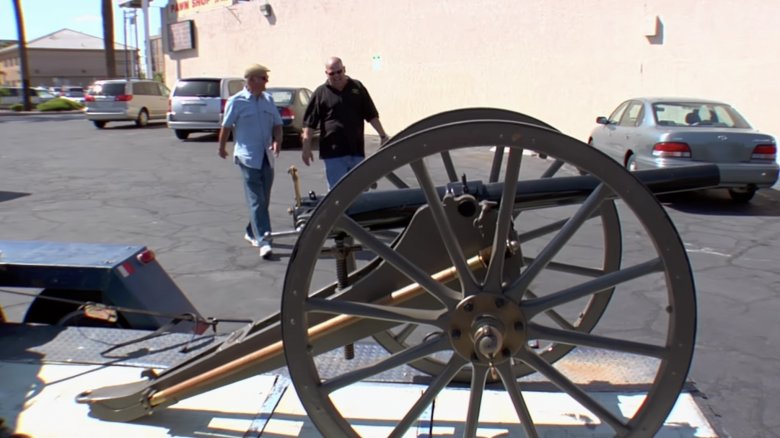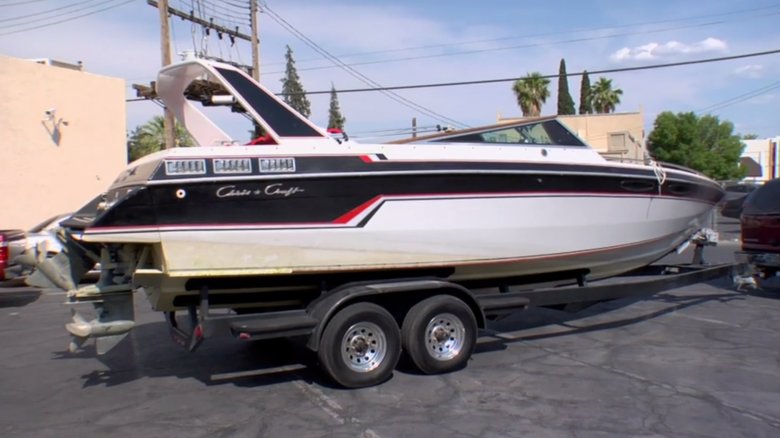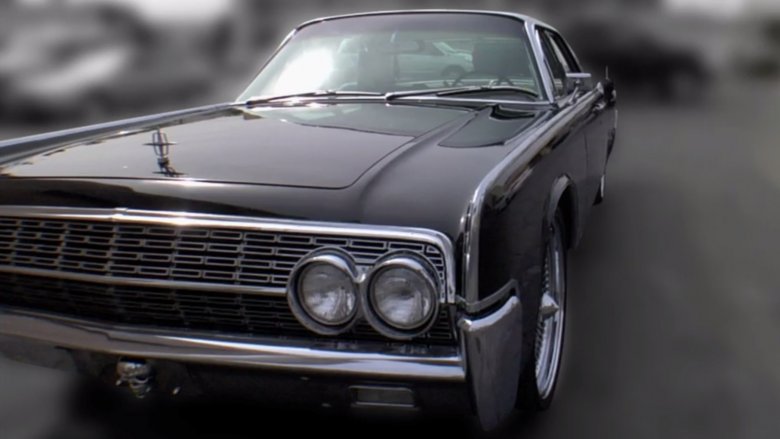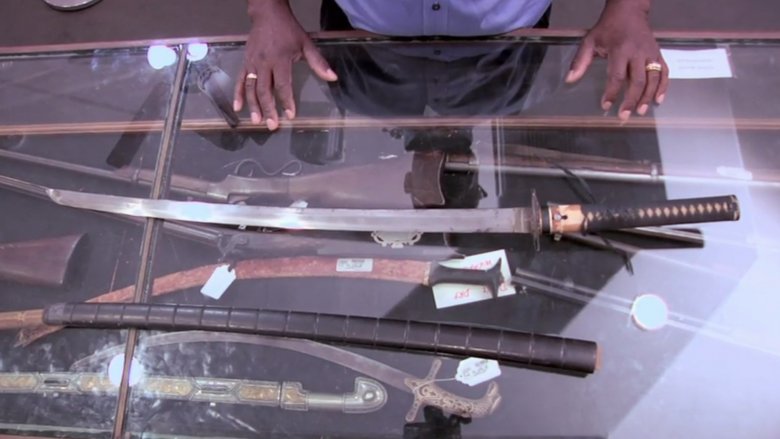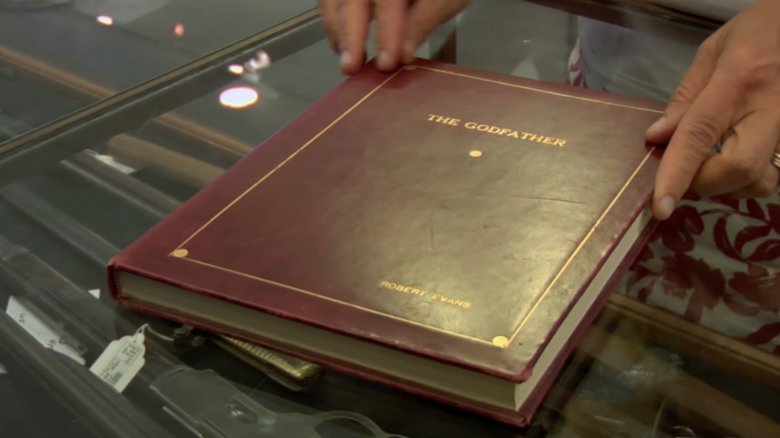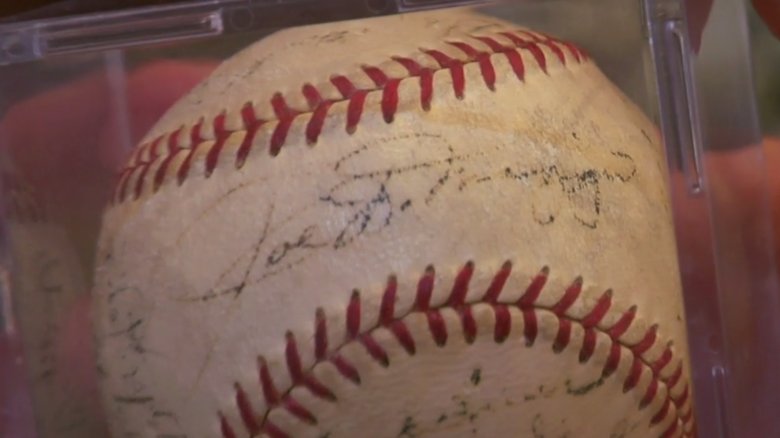Times The Pawn Stars Have Seriously Cheated Customers
Pawn Stars is the wildly successful reality show that centers on the daily transactions of the World Famous Gold & Silver Pawn Shop in Las Vegas. And like any pawn brokers, Rick, the Old Man, Corey, and Chumlee have the difficult task of haggling with sellers.
Obviously, the value of these items is completely subjective and dependent on lots of factors like the rarity and condition, as well as how desperate the seller is for quick cash—not to mention the show's oft-repeated mantra, "I gotta make a profit here." That said, we're choosing to focusing on the times when the Pawn Stars made questionable deals that ended up meaning potential big bucks lost for their sellers.
Book from Isaac Newton's library
When Bob, a seller from season three, walks through the doors of Gold & Silver Pawn with a copy of a 450-year-old book on alchemy that he believes is from Isaac Newton's library, he knows he has something special on his hands.
Of course, the Old Man calls in rare books expert Gary, who informs everyone that it is indeed a book from the famous thinker's collection, although the cover had been restored and re-backed, "probably done in the 1700s." Still, Gary places the retail value of the book at $20,000. Amazingly, Bob then accepts the Old Man's shockingly low offer of $7,000 after being told, "You know if I give you seven for it, I won't have money for dinner tonight." Apparently, the Old Man pays over $13,000 for a meal.
Just to put a bow on top of this plainly awful deal, it turns out much of the rest of Newton's book collection has either been destroyed or archived at Trinity College, Cambridge in England, meaning in reality, this tome is actually a priceless piece of history.
1890s Colt .45 Peacemaker revolver
In the season four episode "Peacemaker," Rick buys an eponymous 1890s Colt .45 revolver, which he says "sell better than just about any antique gun I carry." Rick's excitement is palpable, especially after the seller, Brian, foolishly reveals he purchased it for $25. They eventually agree on a price of $3,000.
Upon inspection of the revolver, weapons expert Sean tells Rick that the gun is worth "at least five [thousand]" in its current condition. But in fact, depending on exactly how rare the specific model is, it could be worth much more. For instance, the first-ever Colt .45 Peacemaker, originally manufactured in 1873, was sold at auction in 1987 for a whopping $242,000, according to The New York Times. Granted, the gun featured on Pawn Stars was from much later and was likely part of a larger production line, but the current pricing on similar-era Colt .45s ranges from around $2,000 all the way up to $42,000. So, yes, Rick made an offer within that market range—but not surprisingly, it was on the extremely low end.
Hotchkiss Cannon
Field artillery collector Chuck rolled his 1890 Hotchkiss Cannon into the parking lot of Gold & Silver Pawn aiming to land a deal. Things were looking up when Rick asked his weapons expert, "What can I pay for it and still make a few bucks?" To which he replied, "I would say $40,000 all day long."
Of course, Chuck is pleased, but then he immediately commits the fatal flaw of any negotiation, which is to reveal his bottom-line number before the haggling even begins. "I expected about 30 [thousand]," Chuck says, instantly alleviating himself of a potential $10,000. Rick seizes on Chuck's misstep and agrees to $30,000 as long as the cannon still fires. It does, and they shake on the deal. Obviously, you could say, "Well, that's the seller's fault for undercutting himself," but clearly Rick knew what he was doing, and expertly capitalized on the seller's low expectation.
1984 Chris Craft Boat
In a very early episode of Pawn Stars, Corey takes a supposedly huge gamble on buying a 1984 Chris Craft boat for $16,500 before having an expert look it over. As has become the regular schtick of the show, Rick and the Old Man hem and haw at how much Corey spent on such a risky purchase until it's later revealed that with just $4,000 of restoration work, the boat has been restored to an approximate retail value of $30,000.
That probably made for awkward viewing for seller Dino, who says he purchased the boat for $25,000 six months ago, and was looking to "hopefully get no less than $20,000" for it from the pawn shop. "It needs a little bit more work than I can afford to put back into it," Dino says, having no clue that if he would have just somehow coughed up four grand, he could have been looking at a potential break-even, rather than an $8,500 loss.
1962 Lincoln Continental
In another Season 1 episode, Rick and the Old Man make a steal of a deal on a restored 1962 Lincoln Continental. The seller, Devin, says he did most of the engine work himself, but he's "put enough time and money" into it that he's ready to let it go. He says he wants to get $13,000 to $14,000, but the classic beauty has a seriously neglected interior, so Devin eventually parts ways with it for just $9,500.
Interestingly, they note that the original showroom price for the vehicle was $10,000, meaning they actually paid less for the car in 2009 than it cost new in 1962–not usually the case with classic cars in relatively decent shape.
Anyway, there's the usual hand-wringing over whether the restoration costs will financially destroy them ... but they didn't. They spent $15,000 to get the car back into showroom shape but were left with a vehicle worth "$30,000 to $35,000 depending on the buyer," meaning this deal was a possible $5,500 to $10,500 gain for the Pawn Stars.
Yasutsugu Samurai Sword
In what is probably the most egregious example of the guys knowingly underpaying for an item, Corey slashed through a negotiation on a 15th century samurai sword that could potentially net the shop over $10,000.
The seller, David, claimed to be a lawyer who'd kept the sword after a client used it as collateral then failed to return to claim it. Just before the haggling started, Corey admitted via backroom confessional that he'd "seen a few of these sell for thousands of dollars," which is why his opening offer of $800 was laughably shady. The seller, woefully underprepared for the negotiation, said "When he offered me $800 I wanted to jump and do a dance, but I had to keep my cool, because the price was still going up." They agreed on $1,500, and an expert later determined it to be worth around $5,000 to $6,000 in its current condition. However, should Corey be willing to do a $3,000 restoration, he could fetch as much as $15,000 for it. "That's a score, Big Hoss!" Chumlee says as he and Corey high five.
Autographed screenplay for The Godfather
This one falls into the category of an "almost ripoff" since the seller, Diane, didn't part with her item—a copy of The Godfather screenplay signed by "Al"—but we're including it here because of what a bad offer it really was. After Rick's handwriting expert, John, verifies that Diane's leather-bound screenplay is indeed signed by Al Pacino, Rick offers Diane $500 for it, partially based on John's suggestion that it would probably only bring in $1,000 at auction. She simply leaves, saying, "Now that we know it's Al Pacino's signature, a fundraiser would probably net more money than that." And she couldn't have been more right.
According to the Las Vegas Sun, Diane Hutton was with Catholic Charities of Southern Nevada and had obtained the signed screenplay when it was donated along with "thousands of books." When she eventually auctioned off Michael Corleone's real-life John Hancock, it fetched an amazing $12,000. "Oh my gosh, to think those guys offered me $500. What if I had said yes, taken the $500, and run?" Hutton said.
But that's not even the best part. When Godfather producer Al Ruddy got wind of the auction, he stepped forward to say he was the "Al" who signed the script, making the Pawn Stars' valuation wrong for an entirely different reason—and leaving their handwriting expert with egg on his face.
Baseball signed by the 1951 New York Yankees
Another near-miss for a would-be cheated customer came when the Old Man threw a screwball of an offer at seller Clint, who showed up with a baseball signed by the 1951 World Series Champion New York Yankees. After handwriting expert Brenda compared the signature on the ball with "authentic signatures" she brought with her, and determined they were real, she offered this helpful advice: "The value of the ball is really subjective. It just comes down to what a buyer is willing to pay for it and what the seller is willing to get for it."
Clint had already pitched $3,000 as his initial asking price, to which the Old Man, presumably sensing the stinker he was about to send back, said, "I'm gonna shoot you a price, if you don't like it, don't hit me, but I'd be a buyer at about $800." Clint "respectfully declined" and went on his way. And it's a good thing he did.
In 2017, a similar ball was featured on Antiques Roadshow, only this ball was also signed by Marilyn Monroe, who later married team captain Joe DiMaggio. That ball was appraised at $15,000 because it included Marilyn Monroe's autograph, but the expert valued it at $5,000 to $7,000 if it were missing hers. In other words, the Old Man swung for the ripoff fences, but fortunately for customer Clint, struck out hard.
